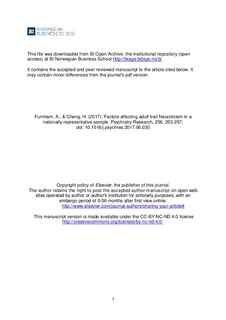Factors affecting adult trait Neuroticism in a nationally representative sample
Journal article, Peer reviewed
Accepted version
Date
2017Metadata
Show full item recordCollections
- Publikasjoner fra CRIStin - BI [1015]
- Scientific articles [2173]
Abstract
This study explores factors in childhood and adulthood that affect adult trait Neuroticism in a large, nationally representative sample. 5785 participants provided information on family social background measured at birth; Intelligence assessed at 11 years; Behavioural problems measured at 11 years; Malaise assessed at 23 years; Educational qualifications obtained at 33 years; Occupational levels at 42 years, and personality trait Neuroticism measured at 50 years. Structural equation modelling showed that sex, childhood Behavioural Problems, childhood Intelligence, Malaise in early adulthood, and Occupation were all significant and independent predictors of adult trait Neuroticism. Parental social status was significantly and negatively associated with Malaise at age 23, but was not a significant predictor of trait Neuroticism at age 50 years. Education predicted Neuroticism mainly through occupation. The strongest predictor of trait Neuroticism at 50 years was Malaise measured at 23 years, with a corrected correlation of r = .42 over the 27 year period. The results suggest some underlying biological/genetic mechanism.
